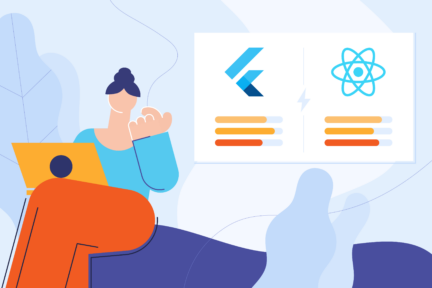In the ever-evolving world of mobile app development, choosing the right framework isn’t just a technical decision; it’s a cornerstone of your project’s success. With the number of apps on the Google Play store reaching 3.95M and Apple’s App Store expected to reach 1.83M this year, competition is fierce.
How can you make sure your app stands out in a competitive space?
Well, we’ve got the answer for you! You have come to the right place to discover the secret sauce of mobile app success. Here’s what we’re going to cover:
- Framework Showdown: A closer look at the top mobile app development frameworks today.
- Community and Support: Exploring vibrant developer communities and their arsenal of resources.
- Real-World Wins: Case studies showcasing framework power.
- The Cost and Ease Equation: Balancing the budget with adoption simplicity.
- Security and Future-Proofing: Safety aspects and future of mobile app frameworks.
Choosing the Right Mobile App Framework: Key Factors for Success
Selecting the right mobile app development framework is a major decision that can significantly impact the success of your project. With the tech world rapidly evolving and user expectations constantly changing, making the right choice is more important than ever.
Here’s what you need to consider
- Compatibility with Business Goals: It’s vital to choose a framework that aligns with your business objectives. Whether your goal is rapid market entry or developing a scalable, long-term solution, each framework has its strengths.
- Consider how the choice might impact your mobile app retention strategies, as the right framework can significantly influence user engagement and retention.
- For long-term scalability, choose frameworks proven to enhance user engagement, as a 5% increase in user retention can boost profits by up to 95%.
- Technical Robustness: Assess the performance of each framework, its compatibility with various devices, and support for the latest mobile features. This evaluation is a part of the comprehensive mobile app development process, ensuring a seamless user experience.
- Community and Ecosystem: Opt for frameworks backed by active communities and robust ecosystems. This support is crucial for accessing a range of resources, which can streamline the development process and enhance your app’s capabilities, indirectly influencing user retention and conversion rates.
- Cost Effectiveness: Look beyond initial development costs. Consider long-term maintenance and scalability, as these factors can impact the overall budget and affect the mobile app conversion rate.
- Ease of Adoption: When transitioning from other mobile app development languages or if your team is new to a framework, the learning curve becomes an essential factor. Some frameworks are more beginner-friendly and have extensive learning resources, making the transition smoother.
- Security Features: In an era where data breaches are becoming increasingly common, the security features of a framework are paramount. Beyond safeguarding user data, robust security helps prevent mobile app development mistakes and plays a vital role in maintaining user trust.
- In 2023, the number of data compromises in the United States stood at 3,205 cases which underscores the importance of a framework’s security features.
While there are many frameworks available, weighing these factors ensures you pick one that not only meets your current needs but is also viable for future developments.
Top Mobile App Development Frameworks Today
There’s a wide range of the best mobile app development frameworks, each with its unique strengths and capabilities. Let’s explore the top mobile app development frameworks that are shaping the mobile app landscape this year, highlighting their key features and how they align with varying development needs.
1. Flutter
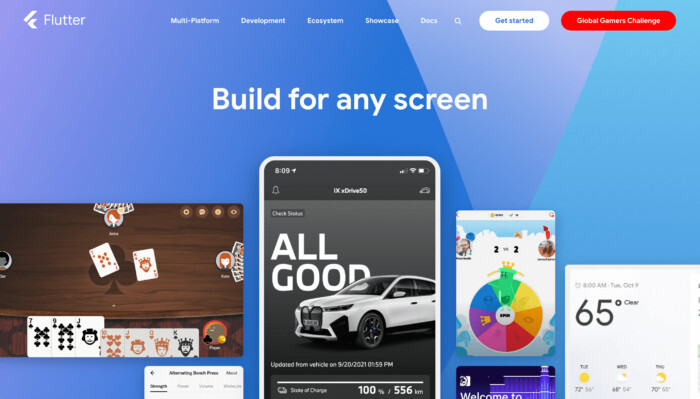
Flutter has become one of the top mobile app development frameworks of all time. Developed by Google, this open-source UI toolkit enables developers to create natively compiled mobile, web, and desktop applications from a single codebase.
Its versatility and high performance make it a top choice for cross-platform app development, catering to projects that demand speed and efficiency with a native feel.
Key Features
- Cross-Platform App Development: Build mobile apps for iOS, Android, and the web from a single codebase. You can even add Flutter to your existing app development frameworks.
- High Performance: Renowned for smooth animations and support for complex UI designs.
- Modular UI Development: Features intuitive UI components for a flexible, widget-based framework. Flutter’s widget catalog includes widgets for accessibility, animation motion, and more.
- Robust Security: Crafted to offer a secure development environment, Flutter introduces ways to report vulnerabilities and best practices to minimize risks.
- Google’s Backing: Benefits from being a Google-developed framework, ensuring continuous improvement and alignment with the latest trends and technologies.
- Best for rapid cross-platform development.
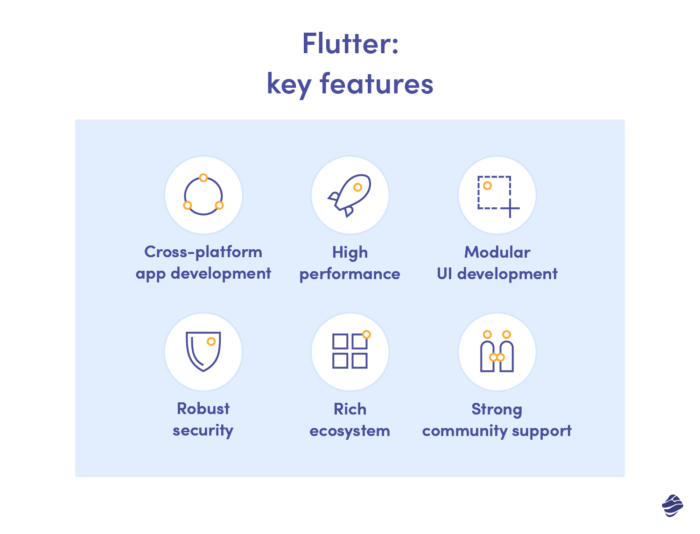
Key Considerations
- Development Time:
- Flutter significantly reduces development time due to its hot reload feature, which allows developers to see changes in real time without restarting the app. This makes the development process faster and more efficient.
- The framework’s ability to create cross-platform applications (iOS, Android, web, and desktop from a single codebase) also speeds up development, as mobile app developers don’t need to write platform-specific code.
- Community and Support:
- Flutter has a rapidly growing community, which is a testament to its increasing popularity. This community contributes to a large number of open-source packages and plugins, enhancing the framework’s capabilities.
- Support is widely available through various channels, including official Flutter documentation, community forums, social media platforms, and numerous online tutorials and courses.
- Integration:
- Flutter integrates well with existing code in different programming languages, making it a versatile choice for adding new features to existing apps.
- It also supports integration with a variety of APIs and services, further expanding its capabilities and ease of use in different development scenarios.
- Scalability:
- Flutter apps are known for their performance and scalability. Its efficient rendering engine (Skia) and the ability to compile to native code ensure that Flutter apps can handle complex and large-scale applications without sacrificing performance.
- The framework’s design supports the development of apps that can easily grow in terms of features and user base.
- Maintenance:
- Maintaining Flutter apps is generally easier compared to maintaining native apps for multiple platforms. This is because Flutter uses a single codebase, reducing the need for separate updates and bug fixes for each platform.
- The wide range of widgets and tools provided by Flutter helps in quicker implementation of design changes and bug fixes.
For JavaScript enthusiasts, transitioning to Flutter is a seamless experience. Flutter’s robust documentation on its official website, coupled with an active and supportive community, provides an ideal learning environment for both new and experienced developers alike.
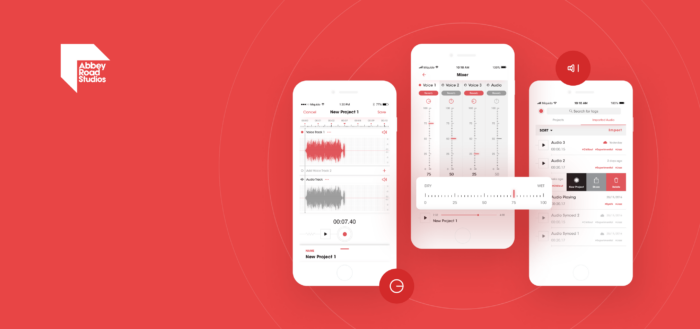
Notable Work: Topline for Abbey Road Studios
Miquido harnessed Flutter to recreate the Topline app for Android, achieving 100% feature parity with the iOS version, thereby fulfilling user demands for a consistent, cross-platform songwriting experience.
2. React Native
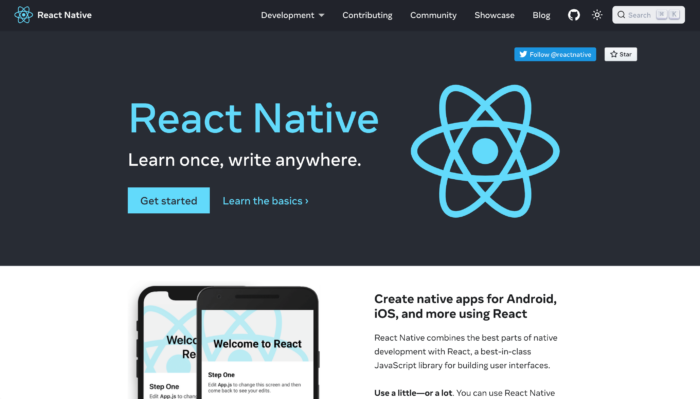
React Native, a Facebook brainchild, has swiftly become a leader in cross-platform mobile application development since its debut in 2015. It has been the framework of choice for creating native app development experiences on iOS and Android using JavaScript.
It became popular with strong community support and recognition from technology leaders. React Native is particularly well-suited for projects that need the native feel of Android and iOS mobile apps with the cost-effectiveness and flexibility of a cross-platform solution.
Key Features
- Single Codebase: Develop for both iOS and Android simultaneously, optimizing the development cycle with a wide JavaScript library for building user interfaces.
- Native UI Components: Utilize JavaScript to create applications that match native aesthetics or to build a new application from scratch.
- Direct Access to Platform APIs: Integrate React Native device features like native rendering, platform-specific components, and APIs that enhance app functionality and ensure full integration.
- High Performance: Comparable to native apps, especially for streamlined applications. This ensures that the apps use the same native platform APIs as other native apps, allowing for optimal performance.
- Vast Community Resources: Benefit from extensive tutorials, libraries, and packages from a global network of hundreds of thousands of developers.
- Best for apps requiring a native feel on a budget.
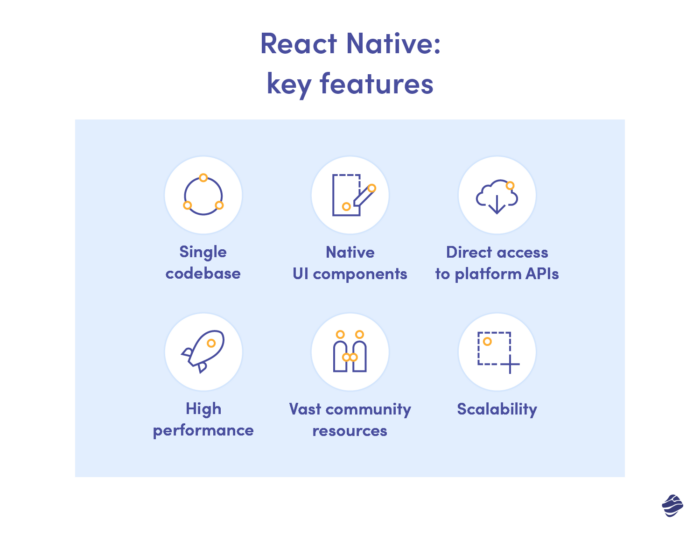
Key Considerations
- Development Time:
- React Native allows for faster development of cross-platform apps (iOS and Android) using a single JavaScript/TypeScript codebase. This reduces the need for different teams for each platform.
- Its hot-reloading feature enables developers to instantly see the result of the latest change, which accelerates the development process. However, for some complex native functionalities, additional native code might be required, potentially increasing development time.
- Community and Support:
- React Native has a strong and active community, supported by Facebook (Meta) and numerous independent developers. This large community contributes to a vast ecosystem of libraries and tools.
- Plenty of resources, such as tutorials, forums, and documentation, are available for developers. However, as React Native evolves, some community resources may become outdated quickly.
- Integration:
- React Native allows for integration with native modules, which is useful for leveraging platform-specific functionality that’s not available out of the box.
- Integration with third-party libraries and APIs is generally straightforward, but it can sometimes require additional native code, especially for more complex integrations.
- Scalability:
- React Native is suitable for building large-scale applications, as demonstrated by its use in high-traffic apps like Instagram and Facebook. However, performance can be a concern for very demanding and graphics-intensive applications.
- The framework is scalable in terms of development, as adding features and maintaining code for multiple platforms is streamlined.
- Maintenance:
- Maintaining a React Native app is more manageable than maintaining two separate native codebases, but it’s not without challenges. Keeping up with updates for both React Native and the native platforms can be demanding.
- Debugging can sometimes be more complex compared to native development, particularly when dealing with issues that arise from the bridge between JavaScript and native code.
Famous App: Warner AO
Developed in React Native, the Warner AO app features seamless onboarding, a detailed FAQ, and a real-time event agenda, setting a new standard in event management applications. Miquido crafted the Warner AO app, a showcase of React Native prowess, delivering comprehensive event management tools on iOS and Android in just 7 weeks.
3. Swift Programming Langauge
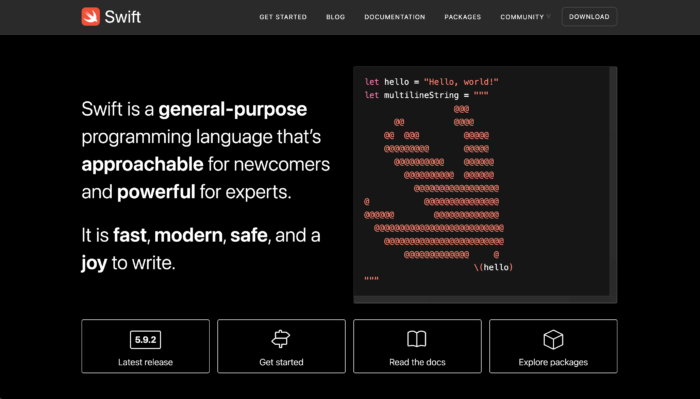
Swift is not just another framework; it’s a powerful programming language created by Apple. Since its introduction in 2014, Swift has revolutionized iOS app development. Renowned for its speed, safety, and efficiency, Swift stands as the go-to language for developers aiming to craft top-notch iOS applications.
Key Features
- iOS Specificity: Tailored specifically for the iOS operating system, Swift guarantees exceptional performance and flawless integration with the Apple ecosystem.
- Speed and Power: Swift is acclaimed for its rapid rendering engine, facilitating the development of intricate and high-performing applications.
- Safety Focus: With features like automatic memory management and proactive error handling, Swift minimizes the risk of crashes and enhances security.
- Modern, Clean Syntax: Its intuitive and expressive syntax simplifies coding, making development more efficient and straightforward.
- Integration with Apple Ecosystem: Swift’s compatibility with Apple’s tools and frameworks simplifies processes like integrating APIs and leveraging Apple’s advanced features.
- Best for high-performance iOS mobile app development
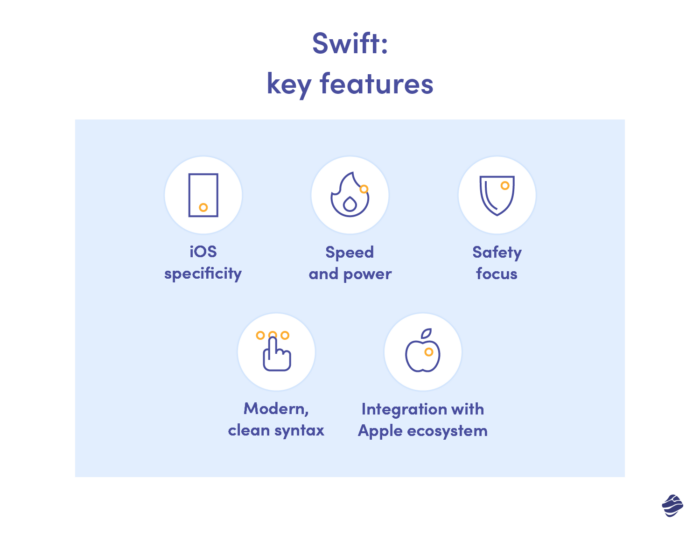
Swift in Different Development Contexts
- Native iOS Development: Ideal for crafting high-performance, native iOS apps, Swift offers unparalleled integration with iOS features and capabilities.
- Cross-Platform Development: Swift can also be used for the development of cross platform mobile applications, providing a unified codebase for iOS and other operating systems.
- Web-Based Mobile Development: For web-based applications, Swift can be combined with JavaScript and HTML to create interactive and robust web technologies..
Key Considerations
- Development Time:
- Swift is known for its clean and expressive syntax, which can make the development process faster and more efficient, particularly for those already familiar with Apple’s ecosystem.
- While it’s primarily used for developing iOS and macOS applications, Swift’s development time can be longer compared to cross-platform frameworks like Flutter or React Native, since it focuses on developing for each platform individually.
- Community and Support:
- Swift has a strong and growing community, backed by Apple. The language’s open-source nature has encouraged contributions and support from developers outside of Apple as well.
- Resources such as detailed documentation, forums, and numerous third-party tutorials and courses are available, providing ample learning and support opportunities.
- Integration:
- Swift integrates seamlessly with Apple’s ecosystem, including Xcode, Apple’s IDE, and various Apple APIs and frameworks like SwiftUI and UIKit.
- It also offers good interoperability with Objective-C, allowing for easier integration with existing Objective-C codebases.
- Scalability:
- Swift is highly performant and suitable for both small and large-scale applications. Its performance is optimized for the Apple ecosystem, ensuring smooth scalability as the application grows.
- The language’s features, like optional and strong typing, contribute to building robust and scalable applications, minimizing potential errors as the codebase expands.
- Maintenance:
- Maintenance of Swift applications is generally straightforward, particularly within the Apple ecosystem. The language’s modern features and syntax contribute to easier code management and updates.
- However, when it comes to multi-platform applications, maintaining separate codebases for each platform (iOS, Android, etc.) can be more resource-intensive compared to using a cross-platform framework.
Check out Swift’s extensive documentation and active developer community for a solid foundation in high-performance iOS app development. Apple’s comprehensive resources, combined with a multitude of online tutorials and forums, offer invaluable insights and guidance.
Famous App: Airbnb
Airbnb’s seamless, high-quality app experience is a testament to Swift’s robust capabilities. Renowned for its intuitive user interface and reliable performance, Airbnb uses Swift to elevate its app beyond functional richness, achieving aesthetic appeal and user-friendliness. This highlights Swift’s proficiency in powering apps that are sophisticated, yet accessible and engaging.
4. Kotlin Multiplatform
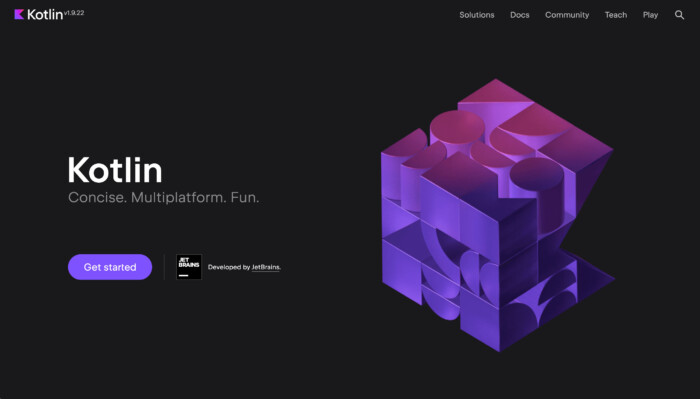
Kotlin has emerged as a modern, efficient, and trustworthy programming language specifically tailored for Android app development. Endorsed by Google, Kotlin addresses many of the challenges previously faced with Java development, offering full interoperability with Java and a host of advanced features.
Key Features for Andoird Development
- Java Interoperability: Kotlin’s compatibility with Java allows for its use in conjunction with Java in the same projects, offering a smooth transition and flexibility in development.
- Conciseness and Clarity: With a syntax more streamlined than Java’s, Kotlin enhances code readability and simplicity, leading to more maintainable code.
- Safety-Oriented Design: Kotlin reduces common coding errors, decreasing the likelihood of crashes and increasing system reliability.
- Modern Programming Features: Supports advanced programming concepts such as higher-order functions and lambdas, elevating its capabilities in app development.
- Best for Android app development, especially complex apps
Kotlin Multiplatform extends the language’s capabilities beyond Android, enabling developers to use a single codebase for both Android and iOS, as well as other platforms. It represents a significant leap in cross-platform development efficiency.
Key Features of Kotlin Multiplatform for Cross-Platform Development
- Unified Codebase: Share common code across platforms while retaining the ability to write platform-specific code.
- Flexibility and Reusability: Develop for multiple platforms with a single codebase, increasing code reuse and reducing development effort.
- Native Performance and UI: Leverage native tools and libraries for each platform, ensuring optimal performance and a native user interface experience.
- Robust Ecosystem: Benefit from Kotlin’s rich ecosystem, including numerous libraries and tools tailored for cross-platform development.
Key Considerations
- Development Time:
- Kotlin Multiplatform allows for sharing code across multiple platforms, including iOS, Android, web, and desktop, potentially reducing overall development time compared to writing separate codebases for each platform.
- The learning curve and initial setup might be steeper, especially for teams not already familiar with Kotlin. However, once set up, it can significantly streamline the development process.
- Community and Support:
- While the Kotlin community is strong, particularly among Android developers, the Kotlin Multiplatform community is still growing. The resources and community support specifically for multiplatform aspects are expanding but are not as extensive as more established frameworks like React Native or Flutter.
- JetBrains, the company behind Kotlin, provides good documentation and support, and there are increasing online resources, tutorials, and forums for Kotlin Multiplatform.
- Integration:
- Kotlin Multiplatform excels in its ability to integrate shared code in Kotlin with platform-specific code, allowing developers to leverage native features and APIs on each platform.
- It requires a clear understanding of how to structure code to maximize shared logic while still writing platform-specific code where necessary.
- Scalability:
- Kotlin Multiplatform is suitable for scaling applications across multiple platforms. By sharing common logic and only writing platform-specific code as needed, applications can be scaled up more efficiently.
- The performance of Kotlin Multiplatform apps is generally good, but since it’s a relatively new technology, there might be some challenges when scaling up very large or complex applications.
- Maintenance:
- The maintenance of a Kotlin Multiplatform project can be more efficient due to the shared codebase. Bug fixes and updates in the shared logic automatically apply across all platforms, reducing maintenance efforts.
- However, maintaining the platform-specific code and ensuring compatibility with each platform’s updates and nuances remains a consideration.
Kotlin Multiplatform is a promising framework for developers looking to leverage Kotlin’s robustness across multiple platforms. But requires careful planning and understanding of how to best structure code for multiplatform use.
The framework is suitable for scalable projects and benefits from JetBrains’ support, but the ecosystem and community are still evolving compared to more established cross-platform frameworks.
Famous App: Duolingo
Duolingo, the widely acclaimed language-learning app, exemplifies Kotlin’s development prowess. Renowned for its interactive and engaging user experience, Duolingo leverages Kotlin to boost both performance and UI quality. This application underlines Kotlin’s capacity to manage high-demand applications while delivering a top-tier user experience.
Future Trends in Mobile App Development
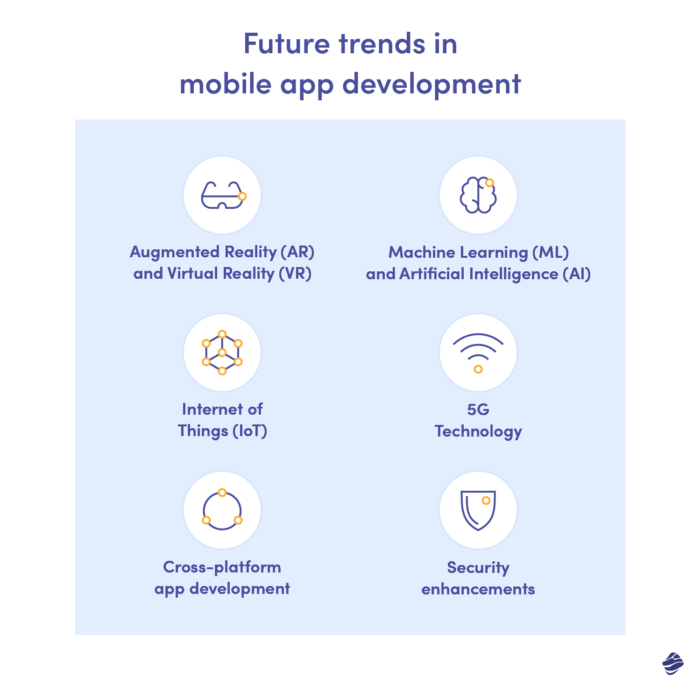
The mobile app development landscape is rapidly evolving, driven by changing consumer expectations, technological advancements, and new development methods. Understanding future trends is crucial for developers and mobile app development companies to stay competitive.
Here are some key trends and how leading frameworks are adapting:
Augmented Reality (AR) and Virtual Reality (VR)
As AR and VR redefine user engagement, frameworks like Flutter and React Native are preparing to incorporate these technologies. Flutter’s customizable widgets are ideal for crafting immersive AR/VR experiences.
For example, Flutter’s work with ARCore and ARKit showcases its potential in AR/VR applications, as seen in various innovative projects available on GitHub and other open-source platforms.
Machine Learning (ML) and Artificial Intelligence (AI)
ML and AI trends are becoming central to personalization and predictive analytics. Frameworks such as Flutter, React Native, Swift, and Kotlin are each making significant strides in this area. Flutter and React Native stand out with their extensive plugin ecosystems, which facilitate seamless AI integration.
- React Native excels in incorporating features like voice and image recognition, greatly enhancing app personalization. This is prominently showcased in its application in social media platforms for face detection, underlining its adaptability in implementing AI technologies.
- Swift is particularly well-suited for integrating complex ML models, especially in iOS applications. This makes it a powerful tool for developers looking to leverage the full potential of AI/ML in Apple’s ecosystem.
- Kotlin’s language ability to work efficiently with AI/ML models makes it an increasingly popular choice for Android app development, offering a sophisticated means to incorporate AI/ML for advanced app functionalities.
Cross-Platform App Development
The demand for cross-platform applications is on the rise, with frameworks like Flutter leading the way in bridging the gap between native and web app performance. The ability of Flutter to integrate more AI features into mobile apps is making it a popular choice for developers looking to create versatile cross-platform solutions.
Security Enhancements
In response to increasing data privacy concerns, frameworks like React Native and Flutter are expected to bolster their security features. With cybercrime damages predicted to cost 13.82 trillion U.S. dollars by 2028, enhancing app security is more crucial than ever.
Crafting Your App’s Future With Miquido
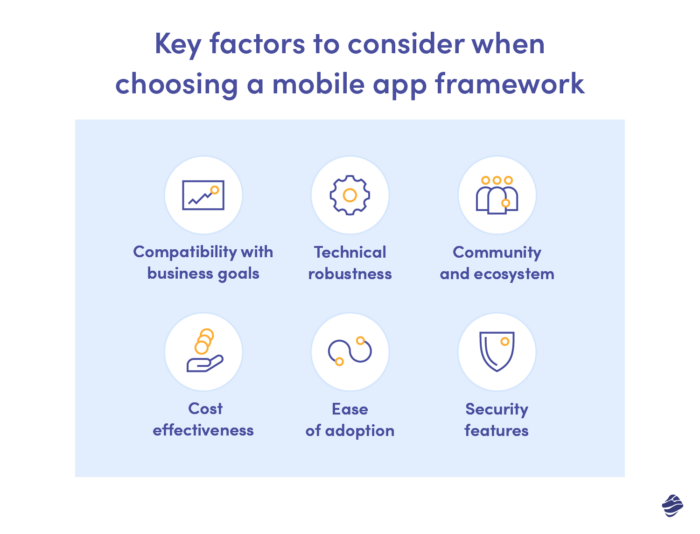
As we’ve journeyed through the world of top mobile app development frameworks, it’s clear that the right choice can significantly shape the trajectory of your project.
Diving into the world of mobile app development frameworks is a game-changer for your project. We’re here to help guide your next app adventure, giving you the know-how to pick the best framework for your needs.
Key Takeaways:
- Choose a framework that aligns with your business goals and user retention strategies.
- Consider the technical robustness, community support, and cost-effectiveness of the framework.
- Ease of adoption and security features are crucial in your selection process.
- Stay abreast of future trends like AR/VR, AI, IoT, and 5G technology in app development.
Starting to build your app? Picking the right framework is just the beginning. At Miquido, we know our way around different frameworks and can help make your app idea engaging and ready for the future. Got an app idea?
Get in touch with us at Miquido, and let’s make something great together.







